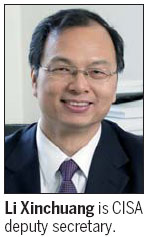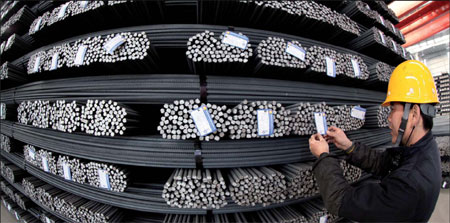Crude awakening
Updated: 2013-02-22 09:43
By Du Juan (China Daily)
|
|||||||||||
|
Facing severe production overcapacity, Chinese steel companies are urged to provide services and products of high-added value. Provided to China Daily |

The boom days for heavy steel are not over, but Chinese manufacturers need to be more refined, move downstream and upmarket
Until last year, China's steel makers had enjoyed at least a 10-year bonanza in producing and selling crude steel, founded on the country's rapid and overwhelming development.
Many sectors, including construction, manufacturing, shipbuilding and auto making, created huge demand for steel, and the industry invested heavily to enlarge production capacity.
With that mass construction and infrastructure program still continuing, the old days are far from over, but as reflected in the economy as a whole, the steel industry has been severely affected - some would say surprised - by changes in demand at home and abroad.
Initially, the industry saw the higher cost of iron ore as a major reason for eroded profits, and sought to counter it by buying into overseas mines and resources operations.
But now, to put it crudely, it is looking to make more sophisticated, high-end products to meet changes in demand.
Since the beginning of the government's 12th Five-Year Plan (2011-15), the economic slowdown has certainly contributed to the fall in steel demand, although it is only part of the picture.
In 2011, China's annual steel demand growth was 7.67 percent while last year, the figure dropped to 3.55 percent, according to the China Iron and Steel Association.
In 2008, China's crude steel output was 500.49 million metric tons, rising to 683.88 million tons last year, a 5 percent increase on 2011, according to Lange Steel Information Research Center, an industrial consultancy based in Beijing.
So, facing severe production overcapacity, experts believe Chinese steel companies should diversify more, strive to get closer to customers, and provide products and services with high-added values.
"In different high-end and niche steel markets, there are still big demand and opportunities for steel companies," says Li Xinchuang, deputy secretary of China Iron and Steel Association. "However, it requires steel companies to change their traditional marketing strategy and consider themselves as solution and service providers instead of pure steel makers."
He says it was also necessary to accelerate mergers and integration of the domestic steel industry to solve the overcapacity problem.
Li says many steel companies tried to win over the market by lowering prices, but this resulted in a damaging price war.
Instead, Li suggests, Chinese steel companies should act quicker to upgrade their products to satisfy demand downstream. As a byproduct, it would also benefit the environment.
"By using more high-strength and corrosion-resistant steel products, the manufacturers can cut consumption of steel and thus reduce carbon emission indirectly," Li adds. "By reducing consumption of steel products overall, it can help the country to save resources and energy."
China still depends on imports for certain high-tech and high value-added steel products such as coating plates, cold-rolled thin plates and electrical steel sheets.
Last year, China imported 13.66 million tons of steel products, of which strip steel was the most imported type, accounting for more than 85 percent of the imports.
The high-end steel products are mainly used in large-scale power transformers, vehicle manufacturing, household electrical appliances, and in the wind and nuclear power industries.
"In the future, high-efficiency and high-end steel products will be the trend," Li says. "The steel makers should develop those kinds of products to satisfy the demand. Meanwhile, the government needs to establish related policies to encourage the application of high-efficiency steel and carry out standards and laws to regulate production."
The domestic steel-sheet market is fierce, Li believes, and it would be good if steel makers could cooperate with downstream manufacturers who use steel as "raw material" for production.
Such manufacturers would include car makers. Steel constitutes about 85 percent of materials for a heavy-duty vehicle and 64 percent for a family car.
Tangshan Iron and Steel Group's output in 2012 was around 16 million tons, yet the steel products for automobile use accounted for a very small portion, and the company is hoping to expand in that sector, planning to double current capacity for automotive use to about 800,000 tons in 2013.
According to Sun Junxue, a spokeswoman for Tangsteel, the steel sheets used in vehicle manufacturing represent high-end products.
In Central China, Wuhan Iron and Steel Group Co has also been developing its automotive-steel manufacturing business in recent years, increasing its output from 100,000 tons in 2005 to 2.12 million in 2011, and making it the second largest auto-steel manufacturer in China after the Baosteel Group.
In September, Wuhan Steel signed a deal to buy the automotive-steel manufacturing unit Tailored Blanks from the German industrial giant ThyssenKrupp AG.
Following suit, Shougang Jingtang United Iron Ore and Steel Co Ltd, a subsidiary of the Shougang Group, says it will produce about 500,000 tons of automotive-steel products in 2013, a huge increase on the 80,000 tons produced in 2011.
Yang Chunzheng, deputy general manager of the group, says the steel industry's problems stem from overcapacity and falling prices due to the economic slowdown, and it was natural that many companies would turn to new products such as automotive steel.
"It is a growing sector with good profitability," says Yang.
In the past few years, Chinese steel companies were more intent on buying iron ore mines overseas in a bid to reduce raw material costs, but several have met with difficulties due to lack of experience in management and local operations.
China's non-financial direct foreign investment in 2011 reached $60.1 billion (45.3 billion euros), the majority of which was in the mining sector.
That year, Sinosteel Corp, a state-owned Chinese metals producer and trader, suspended its $2 billion Weld Range iron ore mining projects in Australia, one of China's largest investments in Australian mining sector.
The reasons given for the suspension were setbacks in developing port and rail infrastructure.
At the same time, some Chinese steel groups were finding other investment opportunities in non-steel sectors.
China's largest private steel maker, Jiangsu Shagang Group, is building a 30 billion yuan ($4.81 billion; 3.62 billion euros) steel logistics park in Zhanjiagang, East China, and Hebei Iron and Steel Group plans to invest about 8.6 billion yuan in the logistics industry during the government's 12th Five-Year Plan (2011-15). Wang Yifang, chairman of the Hebei company, says the revenue from the non-steel businesses of the group will reach 140 billion yuan by 2015.
The company will also expand its businesses into sectors including finance, construction equipment manufacturing, mining equipment and energy-saving industries.
dujuan@chinadaily.com.cn
(China Daily 02/22/2013 page15)
Today's Top News
List of approved GM food clarified
ID checks for express deliveries in Guangdong
Govt to expand elderly care
University asks freshmen to sign suicide disclaimer
Tibet gears up for new climbing season
Media asked to promote Sino-Indian ties
Shots fired at Washington Navy Yard
Minimum growth rate set at 7%
Hot Topics
Lunar probe , China growth forecasts, Emission rules get tougher, China seen through 'colored lens', International board,
Editor's Picks

|

|

|

|

|

|






